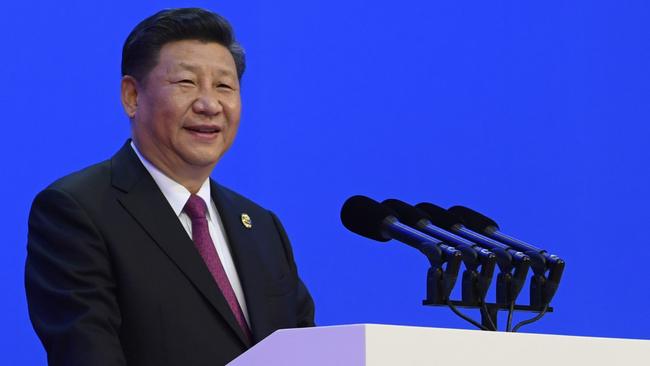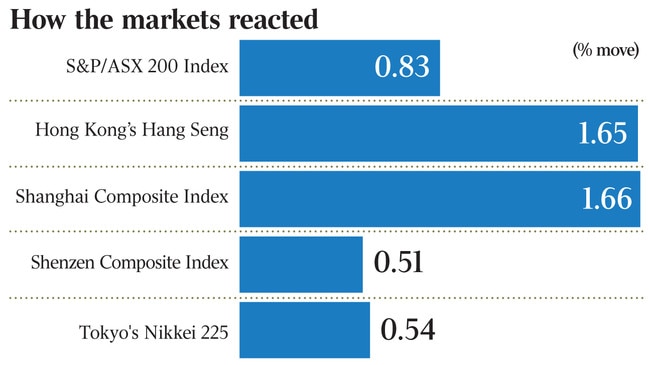Donald Trump hails Xi Jinping as China steps back from brink of trade war
Donald Trump welcomes Xi Jinping’s pledge of a new wave of “openness’’ easing fears of a damaging trade war.

US President Donald Trump has today seized on seemingly conciliatory remarks from Chinese leader Xi Jinping, praising Beijing’s “kind words” as a breakthrough in a looming trade war between the two countries.
Mr Xi yesterday heralded a new wave of “openness”, pledging to allow foreign companies greater access to China’s financial and manufacturing sectors, and signalling lower tariffs on cars in a move to neutralise a damaging trade war with the US.
Speaking publicly for the first time since the trade dispute erupted between China and the US, Mr Xi championed globalisation and China’s plan to continue improving access for foreign interests
China had announced late last year it would take measures to raise foreign equity caps in the banking, securities and insurance industries.
“We will ensure that these measures are materialised,” Mr Xi told the Boao Forum for Asia conference yesterday.
The Chinese leader, considered the most powerful president since Mao Zedong, said the communist nation had already effectively opened up the manufacturing sector, other than for cars, ships and aircraft.
“These industries are now in a position to open up. Going forward, we will reduce as soon as possible limits on foreign investment in these industries, cars in particular,” Mr Xi said.
This morning President Trump welcomed Mr Xi’s speech and apparent willingness to compromise.
The president used Twitter to say: “Very thankful for President Xi of China’s kind words on tariffs and automobile barriers . . . also, his enlightenment on intellectual property and technology transfers.’’ Trump predicted: “We will make great progress together!’’
Very thankful for President Xi of China’s kind words on tariffs and automobile barriers...also, his enlightenment on intellectual property and technology transfers. We will make great progress together!
— Donald J. Trump (@realDonaldTrump) April 10, 2018
Mr Trump’s upbeat assessment of Mr Xi’s remarks at an economic forum on the southern island of Hainan echoed the view of Wall Street, which was firmly in positive territory — adding more than 400 points this morning — after a jittery few days.
Delegates at the Boao Forum in Hainan viewed Mr Xi’s comments, which did not specifically mention the US, as a move to address three of the four main concerns raised by Washington: protecting foreign intellectual property, easing access for foreign investment in Chinese banks and lowering tariffs on car imports.
The White House tempered Mr Trump’s praise of Mr Xi, saying concrete action was needed before Washington would consider scrapping tariffs against Beijing.
“We’re encouraged by the words, but we want to see concrete steps and concrete action,” press secretary Sarah Sanders said shortly after Mr Trump praised Xi’s “kind words” and “enlightenment.” “We want to see more than just the rhetoric,” she added, saying until that happened, tariffs would continue to enter into force
Hours before Mr Xi’s speech, Mr Trump tweeted about his frustration at the disparity between the two countries’ car tariffs. He outlined that while Chinese companies faced a 2.5 per cent tariff to import a car into his country, US auto companies were hit with a 25 per cent tariff to sell into China. “Does that sound like free or fair trade. No, it sounds like STUPID TRADE — going on for years!” his tweet said.

Investors welcomed the conciliatory tone from China, with the Australian sharemarket enjoying its best one-day rise in five weeks. The S&P/ASX 200 rose 0.8 per cent to a two-week high of 5857 points and US stock index futures were pointing to gains of more than 1 per cent on Wall Street. Hong Kong’s Hang Seng Index rallied 1.7 per cent, as did Shanghai’s composite index, with Chinese banks among the sharpest risers. The Shenzhen composite index was up 0.5 per cent.
Trade and Investment Minister Steve Ciobo last night “welcomed President Xi’s speech”.
“It highlights China’s continued commitment to further trade and investment liberalisation. The market has reacted in a reassuring way,” Mr Ciobo said.
China yesterday asked the World Trade Organisation to mediate in its dispute with the US over tariffs on steel and aluminium imports, which Beijing says contradict WTO agreements. A WTO statement said China had claimed the duties of 25 per cent on imports of steel products and 10 per cent on those of aluminium were inconsistent with provisions of the organisation’s General Agreement on Tariffs and Trade. China has requested WTO dispute consultations with the US, which give both parties a chance to resolve the dispute without resorting to litigation.
Mr Xi’s remarks focused on the US-China trade dispute, which had sparked concerns from Australia and other trading partners.
“We hope developed countries will stop imposing restrictions on normal and reasonable trade of hi-tech products and relax national controls on such trade with China,” he said, adding that China would work to expand its imports, and it did not want to see a trade surplus.
“This year we will significantly lower import tariffs for vehicles and reduce import tariffs for some other products. We will work hard to import more products that are competitive and needed by our people,” he said.
Former foreign minister Bob Carr described Mr Xi’s address as a “knockout speech”, serving up a “victory to Trump”. “It is always desirable to give your rival even a qualified victory and this enables Trump to return to his base and boast that he has forced China to open a market to more American vehicles. It will strengthen the notion in Trump’s mind that he can deal with Xi,” Mr Carr said.
The Australian last week revealed China had refused to issue visas to some Australian government officials and business leaders who had planned to attend the Boao Forum. No senior Coalition ministers attended. Mr Carr took aim at the lack of senior Australian government officials at the forum, highlighting that he and former treasurer Peter Costello were both at the conference.
In a speech at La Trobe University today, Foreign Minister Julie Bishop will target the Trump administration, after its moves to “unilaterally raise tariffs and quotas against some of its trading partners”. “This is not consistent with the US as a champion for the past 70 years of more open markets,” Ms Bishop will say. “It is not in Australia’s interests, nor that of the world economy, for any escalation of current tensions into a full-scale trade war.”
Labor trade spokesman Jason Clare said the US and China were “involved in a dangerous game of brinkmanship” but welcomed Mr Xi’s comments. “If this escalates into a full-blown trade war both countries will suffer. And so will the rest of us,” he said.
Mr Xi hailed China’s reform of the past 40 years to open the country and talked of the success of globalisation and the need to continue that progress. He said China would not threaten anyone, attempt to overturn the existing international system, or seek spheres of influence, no matter how much progress it made in development. “We need to respect the development path chosen by each country,” he said. “Hopefully a new approach to state-to-state relations will involve dialogue, rather than confrontation, partnership instead of alliance.”
Additional reporting: Rick Morton





